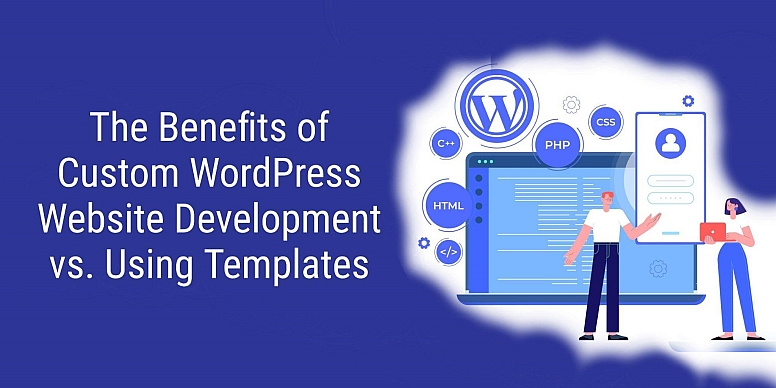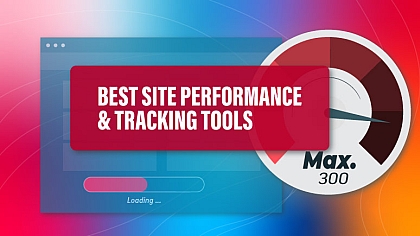
Custom WordPress Website Development vs. Using Templates
WordPress powers over 40% of websites, from simple blogs to complex eCommerce stores (according to a w3techs study). Many businesses and individuals prefer using WordPress for the flexibility it offers. However, a crucial decision must be made when building a WordPress website - whether to do everything from scratch or take the premade route using templates.
Templates are pre-made designs that can be used to create your WordPress websites. Custom development, on the contrary, means creating a website from scratch. We will compare both approaches and discuss their appropriate use cases for maximum impact.
Weigh your options: Tailored website development vs. pre-designed templates
Flexibility and customization
With custom web development, businesses can have absolute control over the design and functionality. The website can be tailored to align with the specific requirements and branding needs of the businesses while providing an excellent user experience to the visitors.
Templates offer multiple pre-designed layouts and structures offering very little to no customizations. They might not always align with the businesses’ unique needs and requirements. It might be challenging to make customizations beyond the parameters of the template.
Performance and optimization
Businesses can have complete control over code and optimization while building a website from scratch. This leads to potentially better performance and faster loading times. However, when choosing a custom website creation technique, firms may run into some performance concerns. A thorough attention to detail is necessary when building such a website. Also, there is a need for responsiveness and cross-browser compatibility across a range of devices and screen sizes, which can be difficult and time-consuming.
Website templates, on the other hand, have several performance advantages that can be helpful to organizations. The best coding and optimization practices are frequently followed by templates since they are pre-designed. They have undergone evaluation and improvement, maybe leading to practical and efficient solutions. This can be especially useful for companies with limited technological know-how or constrained schedules.
Additionally, because a sizable chunk of the design and functionality work has already been completed, templates allow for a quicker development process. It's important to keep in mind, though, that templates may also sometimes contain bloated code or extraneous features that could affect loading speeds and performance.
Time and cost
Custom websites usually take longer time and resources to be developed. The average hourly cost to hire WordPress developers is about $61-$80, they might complete the work in approximately two to six months depending on the businesses’ objectives.
Templates are quick and easy to implement, therefore, it is not essential to hire a website development company to undertake this job. Also, these templates are typically available free of cost. Thus, building a modest website with a couple of pages can take a few hours with templates and can be highly cost-effective.
Support and updates
Each component of a customized website is made to fit the unique requirements and branding of the company, creating a distinctive and highly personalized online presence. This level of customization applies to support and updates as well because developers have a thorough understanding of the coding and can take swift action to fix problems or add new features. To maintain seamless functioning and timely updates, this technique frequently necessitates a greater initial investment and continuing maintenance costs.
Although templates speed up the development process, the template vendor occasionally places restrictions on support and updates. Frequent upgrades could not be exactly in line with a company's changing requirements, and a lot of customisation might cause compatibility problems or hold-up updates. Because of this, even while using templates might result in a quicker launch and lower upfront costs, firms must carefully weigh the trade-off between customisation and continuing maintenance when using this strategy.
Scalability
Scalability is a key consideration when creating a custom website, allowing for smooth growth and extension. This entails adapting the design and coding to manage more traffic, incorporating effective infrastructure, and foreseeing needs in the future.
In contrast, websites built using templates would find it difficult to make large changes due to limits in the architecture, code optimisation, and flexibility, which would hinder scalability.
SEO friendliness
Custom websites can be optimized for search engines, improving the chances of ranking well. When a website is built from scratch, it allows developers and designers to have complete control over various technical and content-related aspects that impact SEO.
When choosing a template for your website, it's essential to consider its SEO-friendliness to ensure that your site can rank well in search engine results as some templates may require additional effort to optimize for search engines.
Security
Custom websites, in contrast to templates, perform better in terms of security due to careful programming, frequent upgrades, and smaller attack surfaces.
While providing efficiency and simplicity in a variety of applications, templates might increase the potential of security flaws, especially if they are not regularly and immediately updated. These pre-made frameworks or patterns frequently serve as templates for building content or systems, making them desirable targets for bad actors looking to take advantage of recognized flaws. Older templates may have out-of-date software parts or configurations that have known security issues, making them more vulnerable to breaches, data leaks, or unauthorized access if they are not maintained. To ensure that templates are resilient against changing security risks and continue to offer a secure platform for varied endeavours, templates must be diligently and frequently updated.
Which approach is right for your business?
When it comes to choosing the right approach for your business, it's essential to consider various factors and align them with your specific goals and needs. Let’s look at them below.
When to choose templates?
You're just starting out: If you’re a startup or a beginner in the online world then templates can be a great choice. They offer pre-designed layouts and structures, saving you a great deal of time and effort. They serve as a foundation to get your website up and running quickly.
Timelines are short: When time is of the essence, using templates is the right thing to do. Custom website development can take a lot of time especially when you need unique designs. Templates on the other hand offer a ready-made solution that can be implemented swiftly.
You don't need a lot of customization: If you don’t have a lot of specifications and your requirements are basic, templates should be enough for you. Templates come with pre-designed elements and styles so you will not need extensive customization.
Budgets are low: Templates are often cost-effective compared to custom website development. They are a more affordable option, making them suitable for individuals or small businesses with budget constraints.
Do note, that custom development is more expensive than using templates if you hire a dedicated developer, set up the infrastructure, and organize everything in-house. You can gain a balance between the benefits of custom web development and the cost-effectiveness of templates by delegating this task to a third-party WordPress web development company.
When to choose custom website development?
When you prioritize safety: Custom website development allows you to create a website with security as the top priority. There is a risk of vulnerabilities with templates owing to their widespread use, but custom development offers greater control over security measures and customized solutions for your individual needs.
You are already established: If you already have a well-established brand with a distinct identity and set of requirements, a custom website can better express your business's personality and values. It enables you to design a unique user experience that is consistent with your brand's image.
When it comes to design: While visually appealing, templates may not offer designs that meet your aesthetic tastes or align with your branding guidelines. Custom website development will allow you to create a website that is unique to your vision and sets you apart from the competition.
When you understand your user journey: If you have a clear understanding of your target audience and their behaviour on your website, custom WordPress development can be used to cater to their specific requirements. Customizing based on data-driven insights can lead to higher levels of engagement and conversion.
While deciding between WordPress themes and custom website themes, it's critical to examine your individual needs, budget, and long-term goals. WordPress themes are suitable for basic websites since they provide convenience, a large range of options, and ease of use. Custom website themes, on the other hand, enable you to create a unique and personalized online presence that completely corresponds with your brand identity and offers extensive capabilities.














